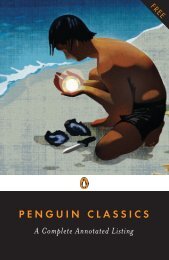Atlas Shrugged Teachers' Guide
Atlas Shrugged Teachers' Guide
Atlas Shrugged Teachers' Guide
You also want an ePaper? Increase the reach of your titles
YUMPU automatically turns print PDFs into web optimized ePapers that Google loves.
Theme and Philosophical Meaning<br />
Ayn Rand stated that the theme of <strong>Atlas</strong> <strong>Shrugged</strong> is: the role of the mind in man’s existence—<br />
and, as a corollary, the demonstration of a new moral philosophy: the morality of rational selfinterest.<br />
In the story Ayn Rand shows by means of both the mind’s presence and its absence that<br />
man’s mind is his survival tool.<br />
The story fully dramatizes this principle, which had been only hinted at in The<br />
Fountainhead. Each species, the author argues, is endowed by nature with specific means by<br />
which to attain survival. For example, birds have wings, elephants formidable size, gorillas<br />
great strength, lions claws and fangs, antelopes foot speed, etc. These animals survive by purely<br />
physicalistic means. But man has no great size, strength or speed. He has no wings to fly, no fur<br />
to keep him warm, no claws with which to kill his prey. Compared to many animal species, he is<br />
a physically unprepossessing creature. The survival tool with which nature has endowed him is<br />
his reasoning mind.<br />
The strike shows in action that every value on which man’s life depends is a product of<br />
his mind—and Galt’s radio address provides the explanation. The houses men inhabit have to<br />
be built, which requires knowledge of architecture, engineering, geometry—which requires<br />
reason. The food men eat must be grown, necessitating knowledge of agricultural science—of<br />
irrigation, cultivation, fertilization, crop rotation, and genetic engineering—which requires the<br />
mind. Similarly, medicines to cure or treat diseases, which must be researched and developed,<br />
and involves the study of biology—which requires the faculty of reason. The same is true<br />
of freedom, which is based on a written Constitution and a Bill of Rights, which requires<br />
knowledge of political philosophy, and consequently the mind. Such examples can be multiplied<br />
many times, but the principle is clear: man’s mind is the ultimate source of every value his life<br />
depends on. Galt, by withdrawing the mind from human society, precipitates decline on a global<br />
scale, demonstrating that when the cause of prosperity is removed, collapse is inevitable.<br />
Galt makes explicit to the strikers the moral code they had always implicitly accepted<br />
and lived by—the creed of an individual’s right to pursue values and personal happiness. The<br />
great creators and achievers had always understood as a subconscious premise that their own<br />
life is the highest value, and that their specific accomplishments which further it are sanctified<br />
by that alone. They had grasped that individuality is a central, ineradicable part of human<br />
nature—that only individuals live, think, act and experience joy. At an emotional level, they had<br />
comprehended that individual human beings have the inalienable right to their own lives, and to<br />
pursue the values that promote it. But they had been battered their entire lives by the opposite<br />
code—the altruist belief that men must sacrifice for society, that they are rightless serfs whose<br />
only moral value lies in the service they provide for others. The thinkers and producers join<br />
Galt because they recognize that his creed of rational egoism is the code of life, and that any<br />
morality requiring men to renounce or sacrifice values is a code of death.<br />
The strikers recognize that the mind needs political/economic freedom, and that statism<br />
stifles all creative thought. For man’s survival instrument to flourish, and for men consequently<br />
10<br />
<strong>Atlas</strong> <strong>Shrugged</strong>–—Teachers’ <strong>Guide</strong> 1<br />
(c) Ayn Rand Institute 2003

















